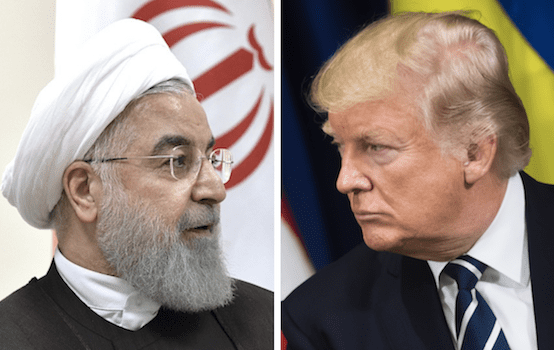The Absurdity of Chasing a ‘Better Agreement’

Frederick Kempe has written a very odd op-ed about Trump and Iran:
Lay aside all the transatlantic and domestic differences that have poisoned the Iran debate, and one is left with a simple question: how can one best alter the Iranian regime’s cost-benefit analysis and render unsustainable its support for proxies, terrorism and nuclear arms ambitions?
Hard as it may be for Democrats and some Europeans to swallow, it would be better to circle the wagons than let differences cloud this opportunity. Hard as it may be for some in the Trump administration to accept, it is time for talks where maximalist positions will need to be compromised.
Trump’s maximum pressure and Iran’s escalating responses have increased the risks of conflict. They have also brought a new chance of resolution that may become the most significant test yet of Trump’s ability to transform his disruptive foreign policy into positive outcomes.
Kempe gets many things wrong in this piece, but the weirdest part is the conceit that everyone that has been engaged in furious debate over the direction of Iran policy should all come together around a “compromise” position that is still incredibly hawkish and not very different from the Trump administration’s policy. There is no “opportunity” here to be seized by “circling the wagons.” Hard-liners in the administration have no interest in compromising their maximalist demands. Iran doesn’t have “nuclear arms ambitions,” and by asserting that they do Kempe is endorsing the Trump administration’s false claims. He wrongly assumes that everyone in the debate shares the same goals and differs only about tactics. The divide in the debate over Iran policy is much wider and more significant than that. It is ridiculous that Kempe talks about “the transatlantic and domestic differences that have poisoned the Iran debate” as if both sides of the debate have been equally responsible for poisoning it. One big problem with all this is that Kempe takes Iran hawks’ bad faith claims to want a “better agreement” at face value, and he mistakenly thinks that they have a chance of getting one.
Supporters of the nuclear deal oppose the Trump administration’s demands for Iran as absurdly unrealistic, and they assume that the administration is seeking war and/or regime change. JCPOA supporters disagree strongly with those goals, and they consider the pressure campaign to be cruel and needlessly harmful to the civilian population. Opponents of the deal have never wanted a “better agreement.” It is silly at best to suggest that there is a “new chance of resolution” when Iran hawks are responsible for sabotaging the agreement that was working exactly as intended. If Iran hawks were interested in a diplomatic resolution to differences with Iran, they would not have been fighting against one for years. The Iran hawks despise the nuclear deal because it took away the nuclear issue as something for them to demagogue and use as a pretext for conflict.
Kempe began his op-ed with a bizarre claim:
Surprising new signs are emerging that President Donald Trump’s controversial “maximum pressure’ campaign on Iran could set the table for new negotiations toward a better agreement.
The “signs” that he cites are not all that significant, and they aren’t surprising. He mentions Zarif’s suggestion of trading an earlier ratification of the Additional Protocol for earlier permanent sanctions relief, and he refers to a recent interview that Ahmadinejad gave in which the former Iranian president floated the possibility of negotiations. Zarif’s proposal was interesting, but it amounted to calling for the sped-up implementation of the JCPOA. That isn’t an offer to negotiate a new agreement, but simply to return to the existing one in order to move up some of the provisions to an earlier date. Ahmadinejad’s opinion doesn’t mean very much. He isn’t in the government, and isn’t likely to be in the future, and he doesn’t have much of a constituency. It would be safe to guess that he is trolling Iran’s leaders by talking to an American paper about negotiations. There won’t be new negotiations unless and until the U.S. rejoins the nuclear deal that it violated, and grasping at straws to pretend otherwise is a useless exercise.
Comments